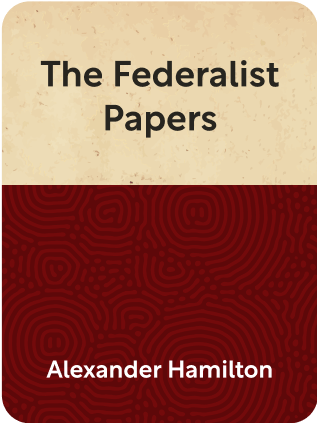

This article is an excerpt from the Shortform summary of "The Federalist Papers" by Alexander Hamilton. Shortform has the world's best summaries of books you should be reading.
Like this article? Sign up for a free trial here .
What is Federalist 9? Why were The Federalist Papers concerned about interstate disputes?
Federalist Paper 9 is about the issue of domestic fighting. The argument was that without the states united under a stronger central government, there was a greater risk of civil wars.
Read more about Federalist 9 and the concerns about interstate disputes.
Federalist 9 Addresses Interstate Disputes
The states themselves, if split into confederations, would devolve into mutual hostilities, particularly as some would inevitably grow to be stronger and more powerful than others. If history was any guide, Federalist 9 argues that they would quickly find themselves in competition with one another for scarce resources and resort to warfare.
If the Union were dissolved, the vast tracts of western lands, subject to competing claims by the states, would rapidly become the focus of war. History again showed that territorial disputes were one of the main causes of conflict. In Federalist Paper 9, Publius did not have to imagine such a scenario taking place in North America—it was already happening, with hotly contested disputes between New York and the states of New England over land in what later became the state of Vermont.
An Assembly of States
The principal weakness of the Articles was one rooted in these general weaknesses that afflict all confederacies—the central government could act upon the states of which it was composed, but not upon the actual people of those states. The states, not the people, were the fundamental political units.
This is an important distinction. It meant that the federal government, acting through Congress, could pass legislation requiring the states to furnish money or manpower to meet some emergency. But it was left entirely to the states to actually marshall those resources from their citizens. This effectively gave each state total discretion as to whether or not they would comply.
Equal Representation, Unequal Outcomes
Another defect of the Articles of Confederation was that they gave equal representation to the 13 states in Congress, regardless of population. While this was intended to protect the smaller states, it paradoxically led to the tyranny and domineering influence of the smaller states.
States representing a small minority of the overall population of the country had effective veto power over national legislation. This was rendered worse by the fact that any legislation required the consent of a supermajority of nine states. Having a minority exert its will over the majority was inimical to the republican values for which the Revolution had been waged. The nation was unable to act as a unified state in key policy matters, constantly subject to the demands and whims of a vocal minority. Federalist 9 was meant to solve this problem.

———End of Preview———
Like what you just read? Read the rest of the world's best summary of Alexander Hamilton's "The Federalist Papers" at Shortform .
Here's what you'll find in our full The Federalist Papers summary :
- The genius of the founding fathers in how they designed the United States Constitution
- Why it was critical for the United States to form a union rather than stay separated as colonies
- How Alexander Hamilton anticipated social issues that are still relevant today






